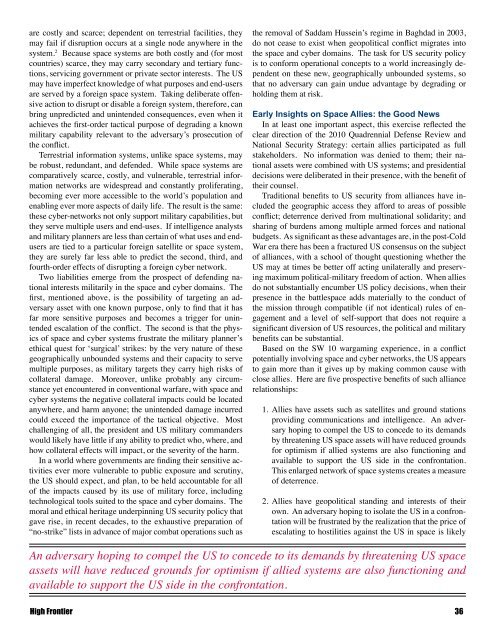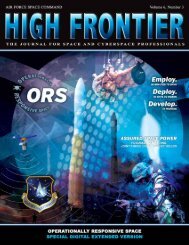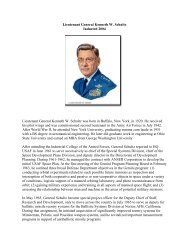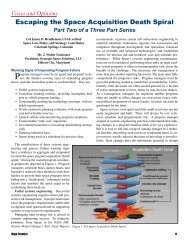Schriever Wargame 2010 - Air Force Space Command
Schriever Wargame 2010 - Air Force Space Command
Schriever Wargame 2010 - Air Force Space Command
- No tags were found...
Create successful ePaper yourself
Turn your PDF publications into a flip-book with our unique Google optimized e-Paper software.
are costly and scarce; dependent on terrestrial facilities, they<br />
may fail if disruption occurs at a single node anywhere in the<br />
system. 2 Because space systems are both costly and (for most<br />
countries) scarce, they may carry secondary and tertiary functions,<br />
servicing government or private sector interests. The US<br />
may have imperfect knowledge of what purposes and end-users<br />
are served by a foreign space system. Taking deliberate offensive<br />
action to disrupt or disable a foreign system, therefore, can<br />
bring unpredicted and unintended consequences, even when it<br />
achieves the first-order tactical purpose of degrading a known<br />
military capability relevant to the adversary’s prosecution of<br />
the conflict.<br />
Terrestrial information systems, unlike space systems, may<br />
be robust, redundant, and defended. While space systems are<br />
comparatively scarce, costly, and vulnerable, terrestrial information<br />
networks are widespread and constantly proliferating,<br />
becoming ever more accessible to the world’s population and<br />
enabling ever more aspects of daily life. The result is the same:<br />
these cyber-networks not only support military capabilities, but<br />
they serve multiple users and end-uses. If intelligence analysts<br />
and military planners are less than certain of what uses and endusers<br />
are tied to a particular foreign satellite or space system,<br />
they are surely far less able to predict the second, third, and<br />
fourth-order effects of disrupting a foreign cyber network.<br />
Two liabilities emerge from the prospect of defending national<br />
interests militarily in the space and cyber domains. The<br />
first, mentioned above, is the possibility of targeting an adversary<br />
asset with one known purpose, only to find that it has<br />
far more sensitive purposes and becomes a trigger for unintended<br />
escalation of the conflict. The second is that the physics<br />
of space and cyber systems frustrate the military planner’s<br />
ethical quest for ‘surgical’ strikes: by the very nature of these<br />
geographically unbounded systems and their capacity to serve<br />
multiple purposes, as military targets they carry high risks of<br />
collateral damage. Moreover, unlike probably any circumstance<br />
yet encountered in conventional warfare, with space and<br />
cyber systems the negative collateral impacts could be located<br />
anywhere, and harm anyone; the unintended damage incurred<br />
could exceed the importance of the tactical objective. Most<br />
challenging of all, the president and US military commanders<br />
would likely have little if any ability to predict who, where, and<br />
how collateral effects will impact, or the severity of the harm.<br />
In a world where governments are finding their sensitive activities<br />
ever more vulnerable to public exposure and scrutiny,<br />
the US should expect, and plan, to be held accountable for all<br />
of the impacts caused by its use of military force, including<br />
technological tools suited to the space and cyber domains. The<br />
moral and ethical heritage underpinning US security policy that<br />
gave rise, in recent decades, to the exhaustive preparation of<br />
“no-strike” lists in advance of major combat operations such as<br />
the removal of Saddam Hussein’s regime in Baghdad in 2003,<br />
do not cease to exist when geopolitical conflict migrates into<br />
the space and cyber domains. The task for US security policy<br />
is to conform operational concepts to a world increasingly dependent<br />
on these new, geographically unbounded systems, so<br />
that no adversary can gain undue advantage by degrading or<br />
holding them at risk.<br />
Early Insights on <strong>Space</strong> Allies: the Good News<br />
In at least one important aspect, this exercise reflected the<br />
clear direction of the <strong>2010</strong> Quadrennial Defense Review and<br />
National Security Strategy: certain allies participated as full<br />
stakeholders. No information was denied to them; their national<br />
assets were combined with US systems; and presidential<br />
decisions were deliberated in their presence, with the benefit of<br />
their counsel.<br />
Traditional benefits to US security from alliances have included<br />
the geographic access they afford to areas of possible<br />
conflict; deterrence derived from multinational solidarity; and<br />
sharing of burdens among multiple armed forces and national<br />
budgets. As significant as these advantages are, in the post-Cold<br />
War era there has been a fractured US consensus on the subject<br />
of alliances, with a school of thought questioning whether the<br />
US may at times be better off acting unilaterally and preserving<br />
maximum political-military freedom of action. When allies<br />
do not substantially encumber US policy decisions, when their<br />
presence in the battlespace adds materially to the conduct of<br />
the mission through compatible (if not identical) rules of engagement<br />
and a level of self-support that does not require a<br />
significant diversion of US resources, the political and military<br />
benefits can be substantial.<br />
Based on the SW 10 wargaming experience, in a conflict<br />
potentially involving space and cyber networks, the US appears<br />
to gain more than it gives up by making common cause with<br />
close allies. Here are five prospective benefits of such alliance<br />
relationships:<br />
1. Allies have assets such as satellites and ground stations<br />
providing communications and intelligence. An adversary<br />
hoping to compel the US to concede to its demands<br />
by threatening US space assets will have reduced grounds<br />
for optimism if allied systems are also functioning and<br />
available to support the US side in the confrontation.<br />
This enlarged network of space systems creates a measure<br />
of deterrence.<br />
2. Allies have geopolitical standing and interests of their<br />
own. An adversary hoping to isolate the US in a confrontation<br />
will be frustrated by the realization that the price of<br />
escalating to hostilities against the US in space is likely<br />
An adversary hoping to compel the US to concede to its demands by threatening US space<br />
assets will have reduced grounds for optimism if allied systems are also functioning and<br />
available to support the US side in the confrontation.<br />
High Frontier 36











